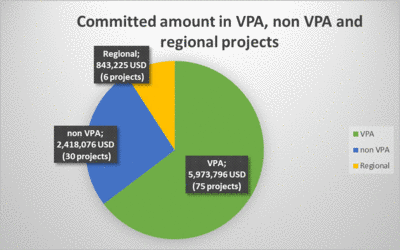Phase I: The ACP-FLEGT Support Programme
The FLEGT Support Programme for African, Caribbean and Pacific countries (ACP-FLEGT Support Programme) was a four-year, collaborative effort between FAO, the European Commission (EC) and the African, Caribbean and Pacific Group of States. This demand-driven initiative, which received EUR 10 million funding from the EC, offered financial and technical assistance to local stakeholder groups – government institutions, civil society and private sector organizations – in ACP countries to put the FLEGT Action Plan into practice. The Programme also supported the analysis and dissemination of FLEGT-related information and experiences among local stakeholder groups.
A summary of key facts and figures related to Phase I of the Programme is available here.
Phase II: The FAO FLEGT Programme
The FAO FLEGT Programme, a follow-on Programme to the ACP-FLEGT Support Programme, began on May 1, 2012 and ended on April 30, 2016.

During Phase II, the Programme developed and managed 108 projects in 32 countries, representing a total commitment of 9.2 million USD. The Programme was most active in VPA countries, where 72 projects were implemented (2/3 of all projects), with a budget of almost 6 million USD over four years. A few projects were implemented at a regional level (for example in the Congo Basin, Mekong Region and in Latin America).
Africa received the biggest invest from the Programme, with 53 projects and more than 5 million dollars allocated to the region due to the the high number of strategic countries in the region (6 VPA and 7 non-VPA countries). Projects in Africa tended to be longer (12 months) and have a higher budget, with an average of 95 000 USD per project.

The Programme in Phase II emphasised community involvement with the FLEGT process, with about 25% of projects related to this thematic, as well as TLAS development, traceability and independent monitoring – important parts of VPA negotiation and implementation.
Thirty projects directly addressed private sector needs, through needs assessment and training activities (10 projects) and promoting compliance with legal requirements and regulations (including support towards certification of SMEs). The need for more targeted and focused support to the private sector became central to the strategy of the Programme's third phase.


